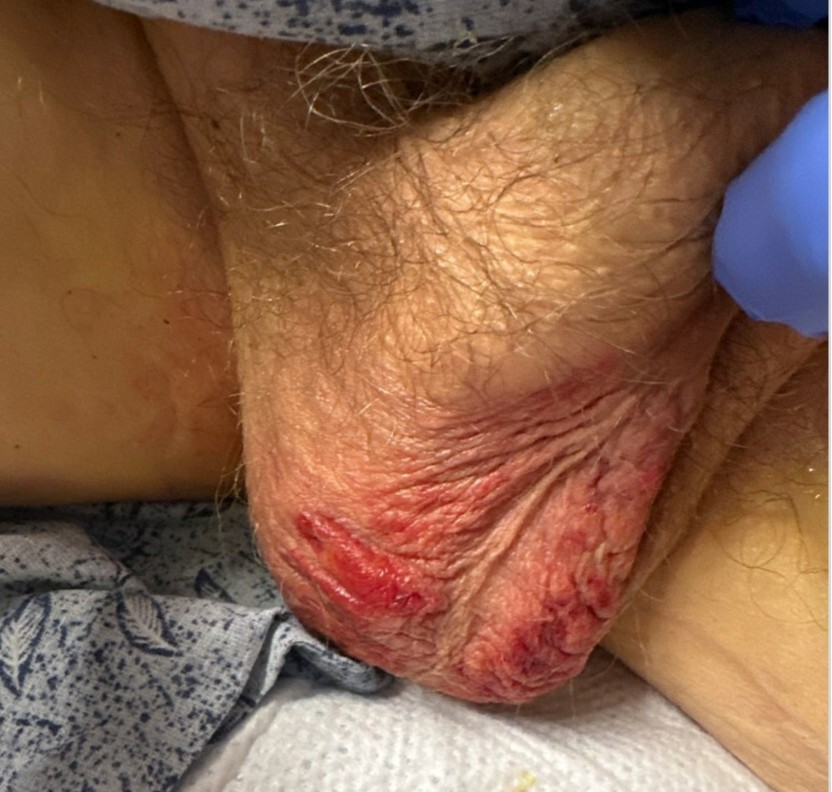Monday Poster Session
Category: Liver
P3989 - Testicular Ischemia Following Terlipressin Use for Hepatorenal Syndrome
Monday, October 27, 2025
10:30 AM - 4:00 PM PDT
Location: Exhibit Hall

Celeste R. Gracey, DO
University of Arizona College of Medicine
Tucson, AZ
Presenting Author(s)
Celeste R. Gracey, DO1, William Matloff, MD, PhD2, Samuel Cheong, DO2
1University of Arizona College of Medicine, Tucson, AZ; 2Banner - University of Arizona Tucson, Tucson, AZ
Introduction: Terlipressin use for hepatorenal syndrome (HRS) has been increasing since its Food and Drug Administration approval in 2022. A vasopressin analog, it is recommended by multiple guidelines as a first-line treatment for HRS. While the most notable adverse effect is respiratory failure, it is also rarely associated with ischemia, especially in the periphery, heart, and intestines. Here, we present a rare instance of terlipressin-associated testicular ischemia.
Case Description/
Methods: A 70-year-old male with lifetime tobacco and alcohol use disorder presented with three days of worsening jaundice, lower extremity edema, and leg spasms. His mean arterial pressures (MAPs) were within normal range, varying from 80-91 mmHg. His Model for End-Stage Liver Disease-Sodium (MELD-NA) score was 30 with a serum sodium of 117 mmol/L. Magnetic resonance imaging showed chronic parenchymal liver disease with portal hypertension. He was treated for his hyponatremia and evaluated for his newly identified cirrhosis. Following a diagnostic paracentesis of 2.8 L, he developed an acute kidney injury, and his MAPs fell to 60-69 mmHg range. After treating his HRS with albumin, midodrine, and octreotide, his MAPs remained below goal and his kidney function continued to worsen. Terlipressin therapy was therefore initiated, with improvement in blood pressure. Three days into therapy, he developed pulmonary edema and testicular pain. On exam, the scrotum and right ventral penis were erythematous and tender without necrosis. A scrotal ultrasound showed an ill-defined hypoechoic region within the left testicle concerning for segmental infarct. Urology recommended conservative management, and the terlipressin was discontinued. He was admitted to the medical intensive care unit for a norepinephrine drip, however his renal function continued to worsen. Given the poor prognosis of hepatorenal syndrome without qualifying for liver transplantation, the patient elected for hospice care.
Discussion: The goal of terlipressin therapy in patients with hepatorenal syndrome is restoring renal perfusion, however terlipressin’s vasoconstriction is not specific to the splanchnic vasculature, and it may rarely result in tissue ischemia. Genital ischemia is a rarely reported complication, likely because the scrotum is well-vascularized. This case highlights the importance of investigating all signs of possible ischemia in patients on terlipressin, including testicular pain.

Figure: A 70-yo M with newly diagnosed cirrhosis developed testicular ischemia without signs of necrosis following terlipressin administration for hepatorenal syndrome.
Disclosures:
Celeste Gracey indicated no relevant financial relationships.
William Matloff indicated no relevant financial relationships.
Samuel Cheong indicated no relevant financial relationships.
Celeste R. Gracey, DO1, William Matloff, MD, PhD2, Samuel Cheong, DO2. P3989 - Testicular Ischemia Following Terlipressin Use for Hepatorenal Syndrome, ACG 2025 Annual Scientific Meeting Abstracts. Phoenix, AZ: American College of Gastroenterology.
1University of Arizona College of Medicine, Tucson, AZ; 2Banner - University of Arizona Tucson, Tucson, AZ
Introduction: Terlipressin use for hepatorenal syndrome (HRS) has been increasing since its Food and Drug Administration approval in 2022. A vasopressin analog, it is recommended by multiple guidelines as a first-line treatment for HRS. While the most notable adverse effect is respiratory failure, it is also rarely associated with ischemia, especially in the periphery, heart, and intestines. Here, we present a rare instance of terlipressin-associated testicular ischemia.
Case Description/
Methods: A 70-year-old male with lifetime tobacco and alcohol use disorder presented with three days of worsening jaundice, lower extremity edema, and leg spasms. His mean arterial pressures (MAPs) were within normal range, varying from 80-91 mmHg. His Model for End-Stage Liver Disease-Sodium (MELD-NA) score was 30 with a serum sodium of 117 mmol/L. Magnetic resonance imaging showed chronic parenchymal liver disease with portal hypertension. He was treated for his hyponatremia and evaluated for his newly identified cirrhosis. Following a diagnostic paracentesis of 2.8 L, he developed an acute kidney injury, and his MAPs fell to 60-69 mmHg range. After treating his HRS with albumin, midodrine, and octreotide, his MAPs remained below goal and his kidney function continued to worsen. Terlipressin therapy was therefore initiated, with improvement in blood pressure. Three days into therapy, he developed pulmonary edema and testicular pain. On exam, the scrotum and right ventral penis were erythematous and tender without necrosis. A scrotal ultrasound showed an ill-defined hypoechoic region within the left testicle concerning for segmental infarct. Urology recommended conservative management, and the terlipressin was discontinued. He was admitted to the medical intensive care unit for a norepinephrine drip, however his renal function continued to worsen. Given the poor prognosis of hepatorenal syndrome without qualifying for liver transplantation, the patient elected for hospice care.
Discussion: The goal of terlipressin therapy in patients with hepatorenal syndrome is restoring renal perfusion, however terlipressin’s vasoconstriction is not specific to the splanchnic vasculature, and it may rarely result in tissue ischemia. Genital ischemia is a rarely reported complication, likely because the scrotum is well-vascularized. This case highlights the importance of investigating all signs of possible ischemia in patients on terlipressin, including testicular pain.

Figure: A 70-yo M with newly diagnosed cirrhosis developed testicular ischemia without signs of necrosis following terlipressin administration for hepatorenal syndrome.
Disclosures:
Celeste Gracey indicated no relevant financial relationships.
William Matloff indicated no relevant financial relationships.
Samuel Cheong indicated no relevant financial relationships.
Celeste R. Gracey, DO1, William Matloff, MD, PhD2, Samuel Cheong, DO2. P3989 - Testicular Ischemia Following Terlipressin Use for Hepatorenal Syndrome, ACG 2025 Annual Scientific Meeting Abstracts. Phoenix, AZ: American College of Gastroenterology.
